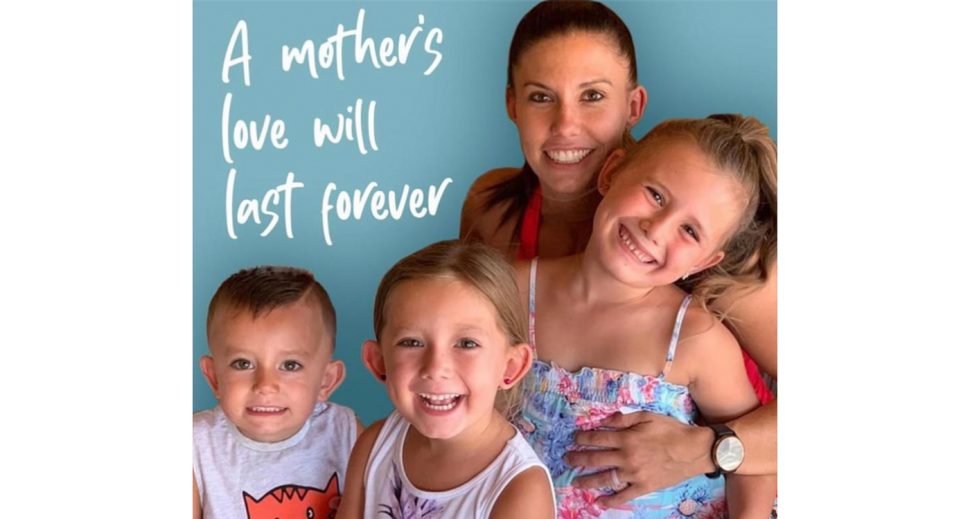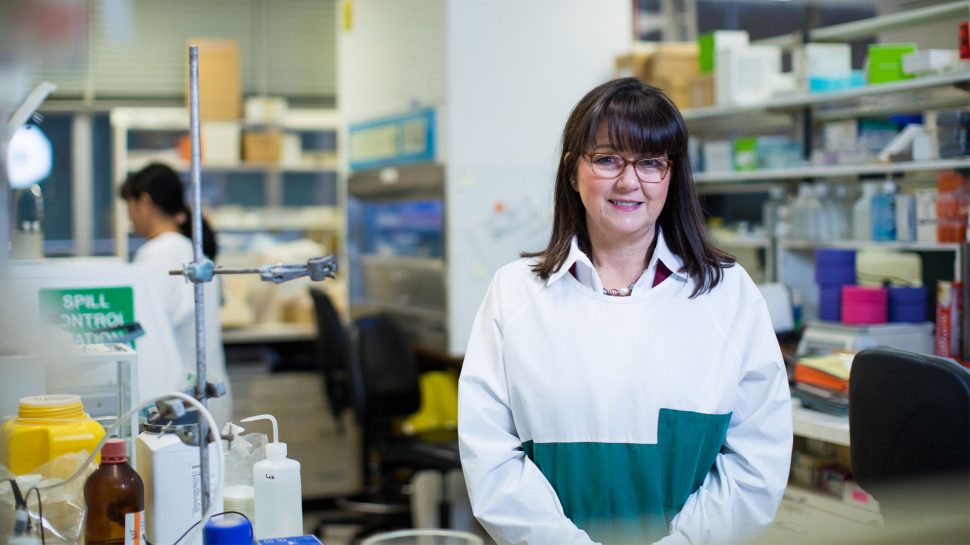Sue & Lloyd Clarke: Campaigning for coercive control laws across Australia
Our 2022 Queensland Australians of the Year, Sue and Lloyd Clarke, have made it their personal mission to educate Australians on domestic violence and champion for coercive control laws to be enacted across Australia. In our 2022 Australian of the Year series, they talk about the rewards of running Small Steps 4 Hannah, misconceptions around domestic violence and what brings them hope.
Warning: This article contains emotionally confronting material.

A single question haunted Lloyd Clarke in the days following the murder of his daughter, Hannah, and his three grandchildren, Aaliyah, Laianah and Trey – how did he not see what was happening in her relationship?
In February 2020, Hannah and her kids were set on fire in their car by Hannah’s ex-partner whom she had left five weeks prior because she feared for her life. When Lloyd and his wife, Sue, spoke to police and domestic violence experts after the attack, his question was answered.
“They told me it was a classic case of coercive control,” Lloyd says. “Sue and I had never heard those words before but when they described the behaviours, we realised that had been Hannah’s life.” And it got them thinking. If these two crucial words were foreign to them and their circle, how many other Australians were in similar relationships and unaware of how bad it could get?
Meet other extraordinary Australians
Meet other extraordinary Australians
Read the inspiring stories of our other recipients and discover how they’re making a profound and positive contribution to their communities.
Coercive control is a gradual process and many victims aren’t even aware of it at first. It starts off with simple things that you can fob off, like your partner constantly calling you but saying it’s because he loves you.
Within weeks, the Clarkes had set up the Small Steps 4 Hannah Foundation with a mission to educate people on domestic violence, raise funds to change laws that protect perpetrators, and campaign for coercive control to be recognised as a criminal offence in Australia. Tasmania is currently the only state that criminalises this behaviour.

In December 2021, a report from the Women's Safety and Justice Taskforce containing 89 recommendations was tabled in the Queensland parliament. The state government has already committed to make coercive control a crime by 2023.
Sue and Lloyd were recently named the 2022 Queensland Australians of the Year in recognition of their work in this area. It’s an honour they’re still getting used to. Lloyd says, “We’re still pinching ourselves. Never in our wildest dreams did we think we would win. It’s extremely humbling and really quite daunting!”
Here, the couple talks about the rewards of running Small Steps 4 Hannah, misconceptions around domestic violence and what brings them hope.
How would you explain coercive control in your own words?
Lloyd: “It's repeated bad behaviour over a period of time during which one person has all the power in a relationship. They control the money, who you speak to, what you wear and where you go. They're always checking up on you. They threaten to harm themselves, the kids or a pet if you leave. And this wears you down so much that you lose your self-esteem and find it hard to leave the relationship.”
What did the early days of Small Steps 4 Hannah involve?
Lloyd: “After launching Small Steps, we found out that people in Queensland had been lobbying for coercive control laws since 2015, so we decided to restart the conversation. Then other foundations started coming on board and we began organising meetings and monthly dinner talks on coercive control.
“Those dinners taught us a lot about the difficulties new migrants have with domestic violence, especially if the bride has no family or social connections here. She's under her husband’s control and he warns her that leaving him would mean losing her visa and children. It's really quite frightening.”

What response did you get from the participants?
Lloyd: “Some people found the talks interesting, others were shocked, and many said, ‘I know someone who could be in this situation.’ We had a few women tell us the talks helped them recognise they were in a dangerous relationship and they got out. That was very rewarding to hear.”
Sue: “We also had a fellow who read up on coercive control and told his wife it was like ‘looking in a mirror’. He has since gotten help, which is wonderful. I do think some perpetrators aren't aware of what they’re doing, especially if they’ve grown up seeing their father controlling their mother. But this example shows they can be helped.”
What misconceptions still exist around domestic violence?
Sue: “That it's only domestic violence if it's physical. If there are no bruises, there's no harm done. The reality is that bruises heal quickly but mental anguish doesn't. Another misconception is that ‘It can't be that bad or she would leave.’”
What are the small ways we can support and empower victims of domestic violence?
Sue: “Let them know you're listening, that you believe them, and that you're there to help when they're ready. It's not easy to leave an abusive relationship. Many have no money and are frightened because they know how dangerous it can be even after they leave. And it's harder when children are involved. Start by planting the seed that there could be a problem in their relationship. And then be patient.”
Lloyd: “We also need to start calling out the perpetrators. They all have friends and family who can see how they're treating their partner. But we have to take a non-judgemental approach with them. Go for a coffee, talk about it and encourage them to get professional help.”

People have always minded their own business and are reluctant to interfere in another family’s issues. This needs to change. We need to start looking out for each other.
What gives you hope in the work you do? And what changes do you hope to see in the next three years?
Lloyd: “What gives us hope is seeing people who were victims getting on with their lives and being happy. In terms of change, we really want to see coercive control laws going national. Then we want to see people getting on board, looking out for each other and educating their children on what respectful relationships should look like. We'd also like to see short-term, low-cost rentals available for victims so they have somewhere to stay while sorting out their finances and getting back on their feet.”
Sue: “A friend recently launched an app called Love&Learn that educates young people on domestic violence. The app presents various relationship scenarios and you assess whether it’s healthy or not. There’s also a relationship questionnaire and when I completed it on behalf of Hannah, I scored 10% which indicates a very bad relationship. If that’s your score, there are suggestions for getting help. It’s my hope that more young people use this app to educate themselves on coercive control, what a good relationship looks like and how to recognise the red flags.”
Australia Post is category sponsor of the Australian of the Year Award and we’re proud to share inspiring stories like yours with the rest of Australia. What comes to mind when you think about Australia Post?
Lloyd: “I have very fond memories of one of my first jobs as a telegram boy at the Kingaroy Post Office. Later I moved on to being a postie, which involved sorting and delivering the mail around town. When I moved to Brisbane, I was transferred to the Holland Park Post Office, and because they decided I was young and fit, they gave me all the bicycle runs with all steep hills.
If this article has raised any issues for you there are services which can help. Here are some organisations you can speak to:
- Beyond Blue – Trained mental health professionals available 24/7. Call 1300 22 2636 or visit the Beyond Blue website.
- Lifeline – 24/7 crisis support and suicide prevention. Call 13 11 14 or visit the Lifeline website.
- Kids Help Line – 24/7 phone and online counselling service for young people aged 5 to 25. Call 1800 55 1800 or visit the Kids Helpline website.
- 1800 RESPECT – National sexual assault, domestic family violence counselling service. Call 1800 737 732 or visit the 1800 RESPECT website.
- Bravehearts - Counselling and support for survivors of child sexual abuse. Call 1800 272 831 or visit the Bravehearts website.
Australia Post is category sponsor of the Australian of the Year Award. We’re proud to partner with the National Australia Day Council and showcase the inspiring stories of remarkable everyday Australians.



